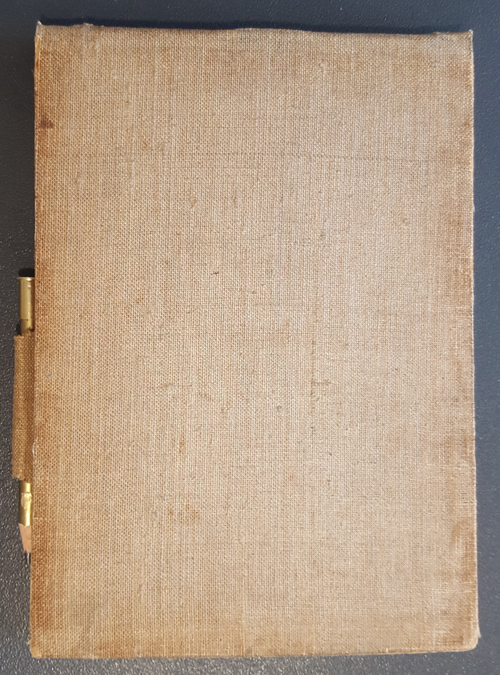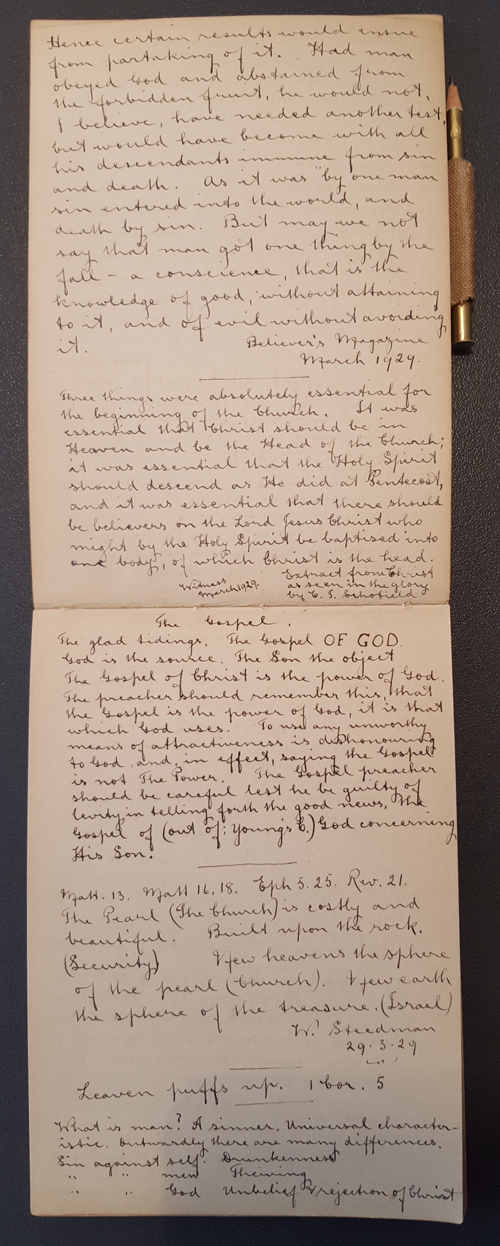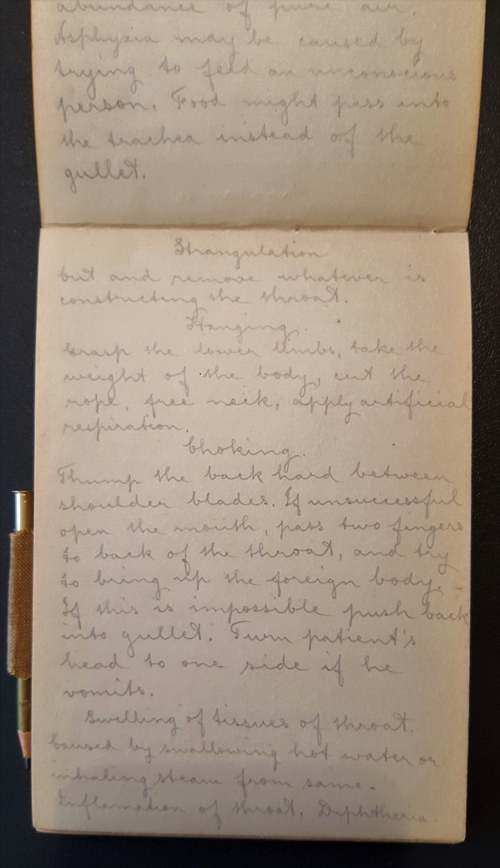| ‘ocracies | ||
| We were trying to declutter the house. In
the course of this, I came across a
 notebook containing
notes written by my mother’s father. It
contains numerous pages of information about
how the notebook containing
notes written by my mother’s father. It
contains numerous pages of information about
how the human body works and
what to do in the case of injury, hanging,
strangulation or poisoning. This was all from
his days as a trainer of St John’s Ambulance
volunteers. However, starting at the back of
the notebook he wrote down, on the other sides
of the pages, his thoughts about his Christian
faith, his views on one or two minor religious
controversies and quotes from religious
magazines which he had found helpful or
inspiring. Altogether, there are about 80
pages of his literate and well expressed
thoughts, in pencil and in pen. They seem to
cover the period from human body works and
what to do in the case of injury, hanging,
strangulation or poisoning. This was all from
his days as a trainer of St John’s Ambulance
volunteers. However, starting at the back of
the notebook he wrote down, on the other sides
of the pages, his thoughts about his Christian
faith, his views on one or two minor religious
controversies and quotes from religious
magazines which he had found helpful or
inspiring. Altogether, there are about 80
pages of his literate and well expressed
thoughts, in pencil and in pen. They seem to
cover the period from  about 1920 to 1930.
As the eldest child in a large, single-parent
family, he used to have to go fishing for eels
in the local river (the Taff) in order that
they had something to eat. As a consequence,
as a child, he received very little formal
education and so subsequently was largely
self-taught. But clearly reading and writing
were very important for him and, according to
my mother, reading and writing were very much
encouraged in the family. about 1920 to 1930.
As the eldest child in a large, single-parent
family, he used to have to go fishing for eels
in the local river (the Taff) in order that
they had something to eat. As a consequence,
as a child, he received very little formal
education and so subsequently was largely
self-taught. But clearly reading and writing
were very important for him and, according to
my mother, reading and writing were very much
encouraged in the family.As I have mentioned before, my mother seemed to have inherited her father’s penchant for writing and, with his encouragement and that of her school teachers, wrote essays and actually won prizes for them. Although I learned to read early on, as a child I received little encouragement to write actual essays and never met my grandfather. So then perhaps my own late-flowering efforts at expressing my thoughts have a genetic basis. Granted that a similar skill in being able to express your thoughts is required in order to be a lawyer, then maybe I was guided into that profession by my genes. To imagine that people follow their natural abilities when choosing careers paths is hardly surprising. It’s also what promotes the idea that meritocracy is a good way of running society. You go with the grain of human nature and so maximise the benefit which individuals can provide for themselves and at the same time for society. There are though many ’ocracies. We used to have that other most ‘natural’ of ‘ocracies, aristocracy. Aristocracy was a basis for running a country which depended on your birth. The Lords and Ladies were the ones with the power in the land. Or at least, the Lords were, with just a few female exceptions. But then there was also the point that power depended not just on birth, but on the order in which people were born. So then, the family’s riches and principal title went to the first born male. The others had minor titles and generally went into the army, banking or the church. And when the lord of the manor died, his widow, the dowager, was evicted to allow the eldest son and his family to live there instead. There is what used to be a Dower House on Coleshill High Street. It was part of the estate attached to Maxstoke Castle. Although for many years used as the Town’s library, it is now in private hands and being converted into apartments. The ‘ocracy which is the most widespread these days, though, seems to be Kleptocracy, although it can be argued that aristocracy was in fact kleptocracy. A kleptocracy is, after all, a political system which permits those in charge to pocket the nation’s wealth - just what an aristocracy permitted and even now permits in the Middle East. But even without a formal system of aristocratic titles, countries such as Russia, other former Eastern Block countries and China have succeeded in recreating the concentration of power and wealth typical of their former aristocracies. And in all such systems, even though lip-service is paid to democracy, it is only ever lip-service. We, of course, take our democracy more seriously. We refrain from kidnapping politicians who oppose the government of the day and have genuine if, at the moment, somewhat ineffective, opposition parties. It’s not currently a system which works very well, granted the dynamics of our electoral system, but then I’ve haven’t seen a democratic system anywhere which consistently works better. We somehow have to draw comfort from Churchill’s aphorism that democracy is better than the other choices open to us. But, here in the West, we consider our model of society to be so much better, not only because of our democracy, but also because of the meritocracy which goes with it - the social system, in which people get success or power because of their capabilities, their ability to work to achieve things and not because of their parents’ money or social position. For society, there is a benefit in having people do what they are naturally fitted to do, something compromised when our lineage enables our advancement. Where we have obtained our positions other than by merit, it is far more likely that we shall be ill-adapted to our roles. This though does leave aside the question of what happens to those, being not very bright or skilled, who, increasingly, will find that they are not fitted for very much in life. Under our system, they are even now mostly unable to find well-paid employment. But we say, well, it is a meritocracy - the clue is in the first part of the word - ‘merit’. It means that we’re worth it. But our genes obviously have something to do with our merit. Although it takes effort to capitalise on an inherent genetic advantage, the fact is that such an advantage is ours purely by chance. And it gives us opportunities which we wouldn't otherwise have which in turn means that we will probably have a better paid position in life. I shouldn’t really complain, but granted the chance genetic component, I’m not sure that ‘meritocracy’ is really the right word. It’s rather self-regarding. Maybe ‘luck of the drawocracy’? And it gets worse, because we know that the advantage inherent in meritocracy can be amplified. My parents were, probably, lower middle class. When I became a solicitor, however, it wasn’t unusual to find people from my background entering the profession. We had benefited from the grammar school system. But, as time has gone on, those who took a similar path to me, and became a lot better off than their parents, decided to get extra, private, training for their offspring in order to get them to the head of the queue. Which means that, now, the social mix in the legal profession has gone back towards what it was in pre-war days, with the upper classes dominating the profession. It has become clear that the same is true of the acting profession and many other activities. Under the old class system, people relied on the privilege of birth to advance their children’s careers. But now we have something similar in its effect: a quasi-meritocracy where, instead of the natural merit of the children being used to determine who should gain advancement, that merit is amplified by the teaching investment able to be made by some parents – which, ironically, is itself a privilege of birth. Now, I am not at all sure what can or should be done to change this situation. We have seen an attempt by universities to help those from disadvantaged backgrounds get places. Recently, we have seen private schools become less affordable and therefore less used. Some well-run state schools expect more from their students and give them the education and encouragement to believe that they too can go to Russell Group universities. While my parents did not push me or my brother in any particular direction, modern university-educated parents expect their children to follow in their educational (and therefore class) footsteps. They become very disappointed if they don't. But in the long run such failure is almost inevitable because it is the inexorable result of a return to the genetic mean. So it seems to me that even if having the money to give one's children a better education will bring a benefit, its effect will probably only last for a limited period. I wonder sometimes if they realise that they are not actually creating a dynasty, but just a wrinkle in the social fabric. 24 May 2021 Paul Buckingham |
||
|
|